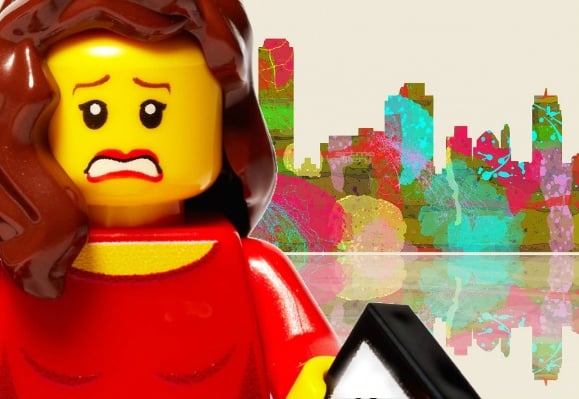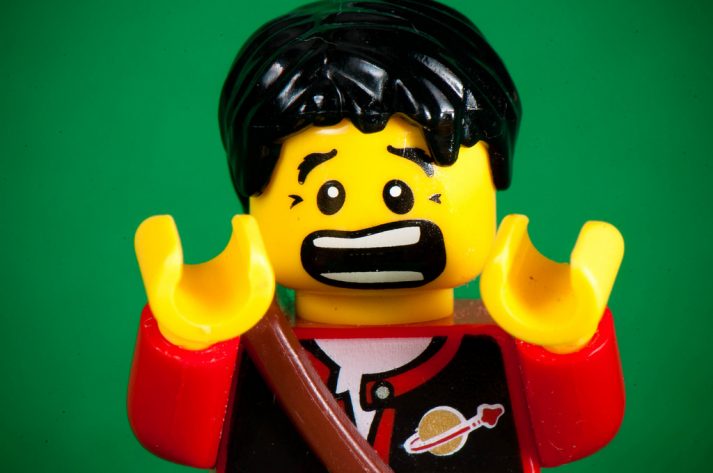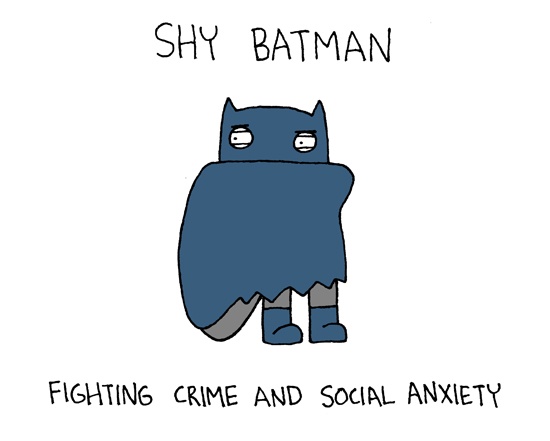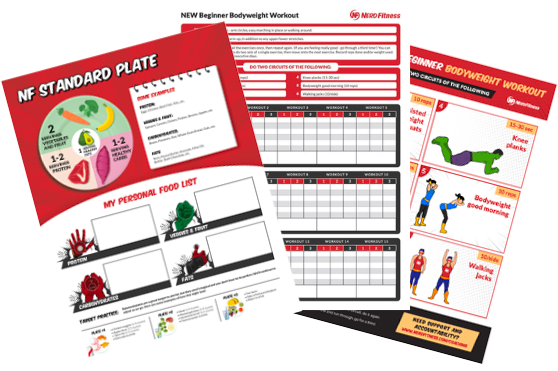
This is an article from NF Rebel Family Correspondent and Mental Health Professional, Dan.
We all know the feeling…increased heart rate, feeling overwhelmed, can’t think clearly, palms sweaty, knees weak, mom’s spaghetti…sorry, I lost my train of thought.
Anyway, that feeling is called anxiety and we all feel it sometimes. It could be about our medical test results, public speaking or whether the Pokémon GO servers will load today.
Anxiety is a normal human emotion that’s part of everyday life. We evolved anxiety to help us avoid danger or perform at our best. A predator near by, or running out of food? The warning bell of anxiety turns on, and changes our physiology to encourage us to act. Sounds pretty cool, right? And for most of us, anxiety kicks on and off in our day-to-day in the modern world without too much trouble.
But for many others, the feelings of anxiety can be much more extreme. It’s like they have it maxed out on their character sheet, and instead of being helpful, it’s an intense and persistent feeling that makes some aspects of day-to-day life an ongoing battle.
This is surprisingly common, but like a lot of mental health issues, we don’t talk about it much because of a stigma which comes from a lack of education and understanding. So let’s change that today!
We briefly covered anxiety in ‘A Nerd’s Introduction to Mental Health’, but today we’re digging a little deeper. The signs, the types, how we can manage it, and maybe even if we can turn it from our enemy to our secret weapon.
Signs of Anxiety

The signs of anxiety aren’t always that obvious to everyone. Largely because we all experience some anxiety, plus symptoms can develop gradually, so it can be difficult to know how much is “too much.”
One of the most common aspects of anxiety conditions is to think about things a helluva’ lot more than you would normally. We’ve all been there, right? Lying in bed, unable to sleep at a ridiculous hour, replaying social conversations in our head from years ago, over analyzing what we said, how others reacted to it, thinking how stupid we were.
We may know what we’re thinking about is irrational and unhelpful, but it’s still hard to stop these overwhelming and sometimes intense thoughts. This thinking tends to be repetitive and often negative in nature, causing our feelings of anxiety to get worse.
This is just one example of a generalized anxiety, and while we all experience different levels or types of anxiety, the common signs and symptoms can include:
Physical
- increased heart rate/racing heart
- shortness of breath
- nausea, even to the point of vomiting
- muscle tension and pain (e.g. sore back or jaw)
- feeling detached from your physical self or surroundings
- having trouble sleeping
- sweating, shaking
- dizzy, lightheaded or faint
- difficulty concentrating
Psychological
- overwhelmed
- fear (particularly when having to face certain objects, situations or events)
- worry
- dread (that something bad is going to happen)
- constantly tense, nervous or on edge
- finding it hard to stop worrying
- unwanted or intrusive thoughts
- uncontrollable or overwhelming panic
Behaviors
- withdrawing from, avoiding, or enduring with fear objects or situations which cause anxiety
- urges to perform certain rituals in a bid to relieve anxiety
- difficulty making decisions
- being startled easily
One key step in turning our anxiety in our favor is recognizing our own signs and then managing these. Knowing the ‘If this then ____’ of ourselves can be a great tool to have. Personally, I know if I start getting the strong urge to pull out my beard hairs (a disorder known as Trichotillomania), then my anxiety level is getting quite high and I need to quickly implement some control strategies (more on those later).
Do you do start feeling sick at the thought of a social event? Do you start fearing the worst has happened to your partner if they’re ten minutes late? What about having to arrange your desk in a very particular way? Just by identifying these behaviors and catching yourself in the act, you can set yourself on a completely different path.
The Sneaky, Formless AnxiEty

Like Mystique or Gumby, anxiety can take many forms, and these forms have varying impacts.
Generalized Anxiety Disorder (GAD): GAD is the broadest type of anxiety and is essentially worrying ‘too much’ about everyday things, or a general, ambiguous sense of worry that’s hard to describe or pinpoint the cause of. But the real question is, how much is “too much”?
Generally (get it?), if you’re having persistent anxious thoughts and feelings on most days of the week, for more than six months, and if these thoughts are interfering with your daily life and well-being, this would be classified as GAD.
Panic disorder: Panic attacks are periods of intense fear or extreme anxiety which happen suddenly or when there is no sign of danger. This could happen while going about your everyday work, and suddenly feeling like you’re losing control and going to die. Physical symptoms such as sweating, feeling short of breath, pounding heart, dry mouth, or feeling as though you’re about to collapse, are common in panic attacks.
Social phobia: An intense fear of being criticised or embarrassed, even in everyday situations, such as meeting people, eating in public, work situations, or making small talk.
Obsessive compulsive disorder (OCD): The need to check things repeatedly, perform certain routines (or ‘rituals’) over and over again, or having certain repetitive thoughts.
Post-traumatic stress disorder (PTSD): Develops after someone is exposed to a traumatic event (like assault, war, or car accident) which can lead to disturbing thoughts or dreams related (however seemingly tangentially) to the event.
Specific phobias: Feeling anxious about a particular object or situation, like going near an animal, going to a social event, and going to great lengths to avoid it. Common phobias include animals, heights, the dentist (my #1 phobia), and blood.
High Five Anxiety: A classic nerd anthem by one of my favourite bands.
These are just fancy names for issues that are pretty common. If any of these things sound familiar, you’re not weird, and you’re certainly not alone. We’re all playing characters with the “anxiety” trait, yours just might need a little extra hand holding.
BUT WHY ME? WHY US?

With all the silly, clinical terms combined with our confused past, it’s clear something of a stigma beast has developed around anxiety (and well, the whole field of mental health). This lurking beast continues to thrive on exacerbated media reports, discrimination, and lack of knowledge… Like those fitness myths that just won’t go away. But in this case, this misinformation can delay or impede getting treatment and recovery for something that is often very very treatable!
We all know (and may even fit) the stereotype: Socially anxious and awkward, introverted, quiet and avoiding small talk at all costs. Although it seems us nerds have a higher propensity for this anxiety, I searched high and low for a research and evidence demonstrating this… (Google Scholar, Psychology Journals, Longitudinal Mental Health Studies, Personality Disorder Test Results AND Encarta 95 Student Edition) but I came up empty.
Anxiety issues affect so many people (around 1 in 5), from all walks of life, whether you’re the reclusive WOW player, a pro athlete, or an amazing A-List Celebrity (please let us know if you’re reading, Emma, or Emma).
Anxiety can manifest itself in a number of ways. As nerds we think of shyness or social anxiety, but anxiety can trigger the opposite, too. I’m sure we’ve all heard “I talk when I’m nervous.”
That may not be satisfying, but there are some risk factors that may make you more susceptible to developing an anxiety condition. These include:
- Traumatic life events – Either as a child or adult
- Stress – Be it due to your health, work, study, finances, or anything else
- Other mental health issues – People with other mental health disorders, such as depression, often also have an anxiety disorder
- Genetics – Anxiety disorders can run in families
- Drugs or alcohol – Abuse or withdrawal can worsen anxiety issues
- Being female – Sorry ladies, but you’re about twice as likely to have an anxiety issue compared to the fellas
This does not mean every overworked female with a family history of mental health issues is going to have an anxiety disorder, it’s just more likely.
I’m often amazed by some I meet who don’t have anxiety issues, they tick all the risk factor boxes, yet remain totally in control of their emotions and behaviors. These are the people who’ve learned how to effectively manage their anxiety, like they’ve picked up the master controller and figured out the Konami code to what’s going on inside their head.
“So Dan, how can I figure out my head’s Konami Code?”
It may not be as simple as “↑↑↓↓←→←→ B A Start” (or just blowing in it), but I’m glad you asked.
identify, battle, level up

So, thinking perhaps you, or someone you know, is having some issues with anxiety? Don’t panic (I know, easy enough to say), because anxiety disorders are highly treatable.
After you’ve recognized your anxiety signs as we talked about above, there are many tools out there for managing your own anxiety. This is not an all inclusive list, but here’s a few ideas to get us started:
Diet and exercise: Surprise, surprise. It’s very well known that eating well can make a difference in your energy levels, and exercise is a natural anxiety buster. It can be difficult to get started if you’re feeling overwhelmed, but starting small and working towards realistic goals is a step in the right direction. One of the first Nerd Fitness posts I ever read, ‘Getting Back On Track When Life Sucks’, is a huge help for anyone looking to battle their anxiety with exercise.
Challenge your thinking: Ask yourself how realistic your anxiety-causing thoughts really are, by weighing up the evidence for and against. Some find taking notes and journaling their feelings to be helpful.
Practice self love: Accepting your flaws and finding yourself can go a long way in building your mental health. Check out the Deadpool Guide to Self Love by Amy to explore this further.
Time-out: Try to make sure you do at least one productive thing you enjoy each day. Be it walking, playing music, cooking, yoga, or meditation. Just do that one thing. Don’t stress so much about everything else going on or multitasking while you’re doing it. Make that time about you and the thing you’re doing.
Avoid avoidance: And certainly don’t Avoid Avoiding Avoidance — I can’t make this any clearer. By always dodging situations that make you anxious, you never get a chance to see that they might not be that bad. Instead, work up that 20 seconds of courage and let yourself experience these feared situations, just a little bit at a time. You’ll find they’re not as bad as you thought, and you can slowly build up a tolerance to what is making you anxious.
Go easy on alcohol and drugs: I’m not here to kill anyone’s buzz, and we’re all free to make our own decisions, but if you’re using alcohol and drugs to cope, you could actually be making your symptoms (not to mention physical health) worse in the long run.
Talk it out: Talking to a friend or family member is a great for expressing how you feel, and also to get an outsider’s perspective on what’s going on. If you’re having trouble finding someone understanding, seek out a counselor or mental health professional. You would seek out a squat coach when you need to make some tweaks to your form patterns, so why wouldn’t you seek out a mental coach when you need to make a tweak to your mental patterns?
Meditation: Learn to be more aware of what’s going on your mind, and give yourself a power up on this quest.
Use Technology: Check out some of the best phone apps for dealing with anxiety through promoting relaxation, mindfulness, and self guided Cognitive Behavior Therapy.
Mastering your own mind and figuring out what works for you is an ongoing quest, but those committed to the mission can recognise the signs, implement strategies that they know work for them, and ultimately start controlling some of their anxiety. An amazing ability to have in high pressure situations.
“There’s more to me than lack of sleep and anxiety”

Again: One in five. One in five of your friends, relatives, colleagues is currently having issues with their mental health, primarily anxiety, and it’s been shown that nearly one in two of us will have a mental health issue at some point in our life.
This isn’t just something that impacts a select few, this affects everybody. Everybody is dealing with anxiety to some degree, but some will be having a tougher time than others.
I need to state this again. ANXIETY ISSUES ARE BOTH COMMON AND HIGHLY TREATABLE, often promptly and without medication, but only about one-third of those having issues seek help. Only one in three! That’s pretty shocking. Anxiety can be self-managed, but only to a certain extent in some cases.
If you find you’ve been taking care of yourself as best you can (and using some of these strategies) but your anxiety symptoms are still winning the battle, please go see a doctor or mental health professional. With the appropriate treatment and support, the vast majority of people can learn to deal with their symptoms and start pwning life again. It’s no different than going to see our physiotherapist for a sprained ankle or a personal trainer to help work on our squatting technique.
If you still aren’t convinced to see a doctor, do it for yourself: what could start as a small anxiety issue can quickly evolve (unlike my 27 Zubats) into something else, and left untreated, this can be devastating.
If you are dealing with anxiety, know that you’re a bad-ass taking on battles in ‘insane mode’ while other plebs are still fumbling around with the controls. You got this.
I urge you all to talk openly about your experiences with mental health issues, this has been proven to assist in slaying the lurking stigma beast we spoke of earlier, feel free to even start sharing now:
How do you deal with your anxiety?
When do you know it’s getting ‘too much’ for you?
What do you wish more people understood about your anxiety?
Rebels, take care of yourselves, and each other.
– Dan-xiety (Sorry, I had to get in a dad-joke somewhere)
If you, or someone you know, would like further support with mental health, here are some excellent links and services that will get you started in the right direction:
North America – Suicide Prevention Lifeline, List of Mental Health hotlines
Canada – Mental Health Helpline, List of Mental Health services
Great Britain & Ireland – Samaritans, List of services via Mental Health Foundation
Australia – National helplines and websites, Lifeline
New Zealand – Lifeline, Mental Health helplines
India – SNEHA
Worldwide – Worldwide mental health hotlines, Worldwide suicide hotlines,Befrienders Worldwide
###
Image sources: Stressed Lego, Shy Batman, Group of Lego Heads


